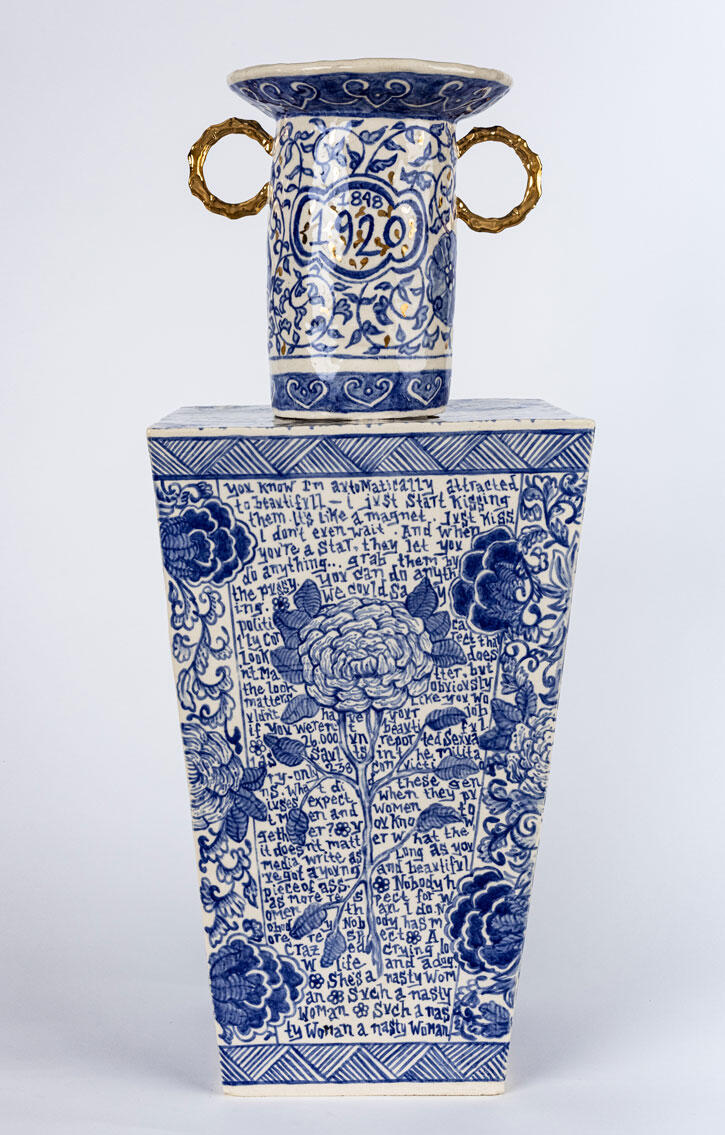Elyse Pignolet’s Aesthetic Strategies for Intersectional Feminism
At Track 16, Los Angeles, the artist presents a collection of orientalist-inspired works that poignantly address current issues of race and misogyny in the US
At Track 16, Los Angeles, the artist presents a collection of orientalist-inspired works that poignantly address current issues of race and misogyny in the US

An elaborate, Chinoiserie-style wallpaper adorns the entrance to Elyse Pignolet’s solo exhibition, ‘I’m Not Like the Other Girls’, at Track 16 in Los Angeles. Rendered in a traditional blue and white palette and appropriating stock orientalist elements (pagodas, weeping willows, swooping birds) from 18th-century British ‘willow’ pattern ceramics, the opening salvo of the LA-based, Filipino-American artist’s show would seem to suggest a critique of the imperialist visual practices that shaped the history of the decorative arts in the West. But the presence of the words ‘Gold Spa’ in bubble lettering across the top eave of every tranquil pagoda – a damning allusion to the three massage parlours where six women of Asian descent were shot and killed by a white man in Atlanta in March of 2021 – reveals the artist’s concern with more contemporary issues of subjugation and domination.

The two elongated and light-filled rooms that comprise Track 16 – located on an upper floor of the Bendix Building in the rapidly gentrifying Fashion District – house more than 80 of Pignolet’s new ceramic pieces and watercolour works on paper. Completed during the pandemic and informed by the doomsday news cycle attending former US President Donald Trump’s last year in office, many of the works integrate misogynistic words and phrases – ‘bitches’, ‘prude’, ‘unhinged’ – into their decorative and intentionally hand-built facture as a means of highlighting the continued proliferation of sexist discourse in popular culture and politics. Within these exists a polemical and personal set of works directly addressing the anti-Asian femicide in Georgia. Pagoda (2021), a curvy, multistorey structure bearing the overtly racist and sexist phrase ‘me love you long time’, calls out American fantasies of a sexually servile woman of Asian descent. Several carefully embellished ceramic plates quoting statements made by Atlanta’s police chief in the massacre’s aftermath – He Was Pretty Much Fed Up and A Really Bad Day for Him (both 2021) – underscore the asymmetrical power relations that set the criminal justice system against women of colour.

Other remarkable works include: the watercolour collages Most Petulant Little Madam and Can You Give Us a Twirl (both 2021), which evoke media moments from the last year in which top-seeded women tennis players were publicly denigrated by male news commentators; the floral- and vine-patterned ceramic platters THOT and Honey Trap (both 2021), which make ironic use of derogatory descriptions of sexually autonomous women; and the gold-trimmed vessel Declaration of Rights and Sentiments (Trump) (2020), one of the largest stand-alone pieces in the show. The latter acts as a host for two warring positions on the matter of gender equality in the US: Elizabeth Cady Stanton’s Declaration of Sentiments from the 1848 Seneca Falls Convention and the transcript of Trump’s 2005 Access Hollywood tape as well as his 2015 interview with Rolling Stone, in which he mocked the physical appearance of presidential candidate Carly Fiorina. Meticulously copied in Pignolet’s cobalt-blue script and tightly truncated along the surface area of the ceramic work, the inspirational and incendiary passages on this final piece serve alternately as figure and ground – a text under close scrutiny and decorative embellishment when seen from afar. This perceptual dissonance can be felt throughout Pignolet’s show, provoking us into a deeper engagement with the work.
As a rejoinder to the alarming context facing women in this country – a right-leaning Supreme Court, the potential collapse of Roe vs. Wade, the appalling rise of Black maternal mortality, angry incels with guns, increased attacks on LGBTQ+ rights and a disproportionate share of job losses due to COVID-19 – Pignolet’s aesthetic strategies reassert feminism’s emancipatory potential with the simple but necessary reminder that until all of us are safe, none of us are.
Elyse Pignolet’s ‘I’m Not Like the Other Girls’ is on view at Track 16, Los Angeles, until 20 November.
Main image: Elyse Pignolet, Adjust to Injustice (detail), 2021, ceramic with glazes, 28 × 43 × 2.5 cm. Courtesy: the artist and Track 16, Los Angeles























